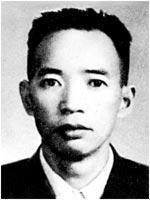Qian Zhiguang
Qian Zhiguang, chief founder of the People’s Republic of China’s modern textile industry, died in Beijing on February 5, 1994 at the age of 94.
Qian was born in Zhuji, Zhejiang Province. He joined the Communist Party of China in February 1927, participated in the Long March in 1934 and was appointed group leader of the CPC Central Committee’s Confiscation Committee. He worked hard to prepare supplies for the Red Army under extremely difficult conditions. After the Long March was completed and the army arrived in the northern Shaanxi Province, he was appointed Director of the Foreign Trade Bureau under the Ministry of Economy of the Shaanxi-Gansu-Ningxia Regional Soviet Government.
During the War of Resistance Against Japan, Qian was the Division Chief of the Wuhan Office and Nanjing Office of the Eighth Route Army and the New Fourth Army as well as the Chongqing Office of the Eighteenth Group Army. When the War of Liberation started, he went to Hong Kong on a financial assignment, and set up the China Resources Corporation, serving as the Chair of the Board.
After the People’s Republic of China was established in 1949, Qian was appointed member of the Economic Committee of the State Council responsible for economic recovery, and was the Vice Minister of Textile Industry. After the ministry merged with the ministries of the first and second light industries in 1970, Qian was appointed Minister and Party Secretary. When the ministry was restructured and divided into the Ministry of Textile Industry and the Ministry of Light Industry in 1978, he was appointed Minister and Party Secretary of the Ministry of Textile Industry. He became a consultant of the State Council in 1981.
Faced with the conflict in land resources for grains and cotton and with the task to solve the problem of “clothing” for the 1 billion Chinese, Qian proposed to develop both natural and chemical fibers. With modern technology introduced from other countries, a number of large-scale chemical fiber production bases were set up, including that in Jinshan, Shanghai; Liaoyang in Liaoning Province; Tianjin; Changshou in Sichuan Province and Yizheng in Jiangsu Province, making China one of the leading countries in chemical fiber production.
